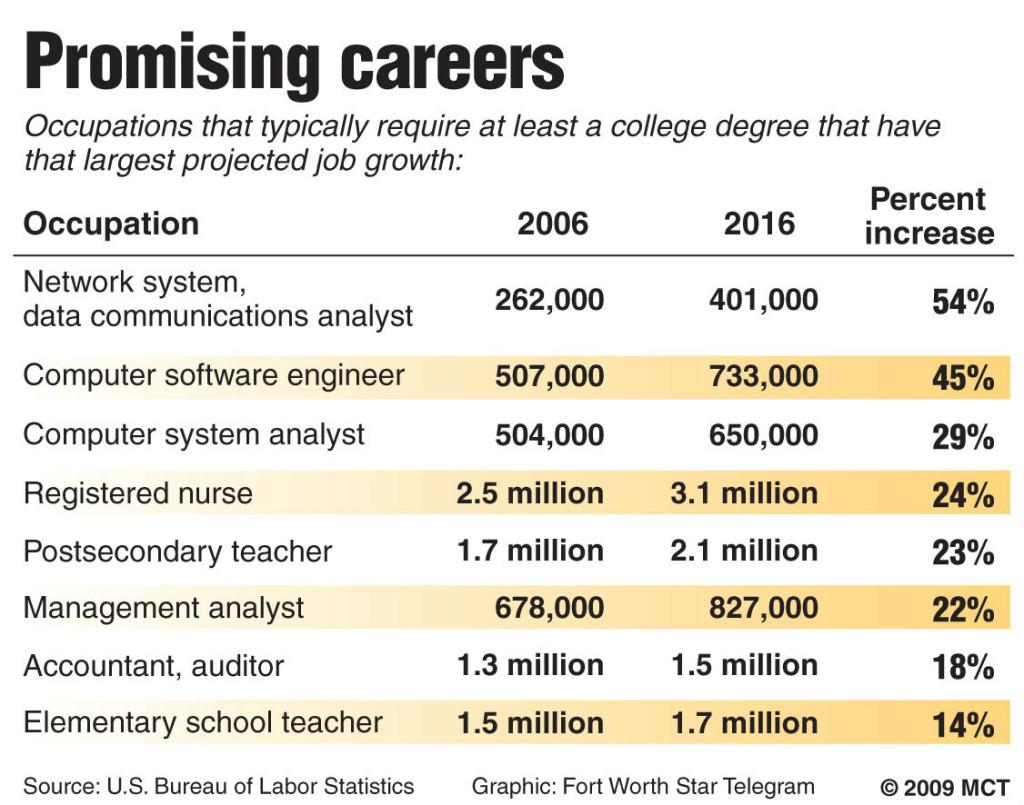Getting your dream job is no longer a nightmare
Chart showing which occupations are projected to have the largest job growth. Fort Worth Star Telegram 2009
November 4, 2013
Generation Lost: Many students, both high school and college age, have no idea what they want to do for the rest of their lives. I am not one of the select few who know exactly what they were born to do, and actually pursue and become it.
We all dream of becoming a CEO or a professional athlete but in 20 years will find ourselves sitting at a cubicle, barely awake, reading progress reports. Luckily, there are ways to prevent the bite that turns us into corporate zombies.
1. College choice is about the career not the football.
College choice can heavily impact where students get jobs and internships, especially if interested in a major in a very slim and specific field. When choosing a college it is important to look school’s retention and job placement rates.
The University of Maryland’s career webpage said, a whopping 75% of students reported getting their first choice post graduate activity/job. Schools like Towson University and Salisbury have high first year retention rates of 84% and 83.7%, while Frostburg State has a retention rate of only 71%, according to About.com’s college admissions site.
Caitlin Stelben, a recent graduate and from Drexel University in Philadelphia majored in Design and Merchandising. She is an assistant buyer for Burlington Coat Factory. Stelben worked hard in high school to land the school of her choice.
According to a Fidelity survey of 750 college graduates, the average debt is $35,200. CNN Money’s website says that as of June 2013 the official unemployment rate of college graduates under 25 is 7%. That’s another reason why choosing a college and major that will pay off can save time and money repaying thousands in student loans.
Connections are vital in the workforce no matter what career you choose. Stelben says that she doesn’t have her dream job yet, but she knows that she is on “her dream career.” Her connections have helped her advance and have given her job opportunities that she might not have gotten on her own.
“The sooner you can start to get an idea of what you want to do, the more time you have in college to expose yourself to certain people or events that can help you network for the future,” Stelben said.
2. Don’t pass up an opportunity, no matter how small.
Internships are just as important as education when building toward a career. Internships show employers that candidates are serious and have good knowledge of the subject in application. Internships can be paid but sometimes not. Either way the skills learned will pay off in the long run.
Stelben has worked many jobs and internships (Michael Kors and Destination Maternity). She attended Teen Vogue’s “Fashion U” and learned about the fashion industry and attended seminars.
“While not every job I have ever had involves fashion, I developed skills such as communication, multi-tasking, and speaking in front of large groups,” Stelben said.
To ensure a better chance of getting an internship, write thank you notes, follow up with the possible employers, and research the place of desired work to make a good knowledgeable first impression.
Sam Denny is a Deputy Fire Marshal at the National Institutes of Health in Bethesda, MD. He has worked there for 18 years and considers it his dream job; although, to him, it’s not all about the money.
“In college I had many opportunities for internships and part time work. As a student I was able to gain valuable work experience and develop good work habits,” Denny said.
Many people are still undecided about their “dream job” and that’s not bad. While still in high school students should try out many different jobs.
“Try everything! You’re never going to know what your dream job is until you dabble in a variety of things and figure out what really sparks your interest,” said Kimberly, a registered nurse at Georgetown University College.
3. Get help: Use the Career Development Office.
Kimberly utilized her professor’s advice and guidance to get her started on the career search, which she said was the hardest part about getting her job. She called several hospitals to get information and potential job information. Her college’s career service office assisted her in writing a resume cover letter and they even gave her a trial interview.
“The dream job isn’t about the job itself. A huge part of why I enjoy my job so much is because of the people I work with [and help],” Kimberly said.
Once students figures out their interests, they can get more help from school counselors and student service advisors. They are equipped to help students write resumes, do trial interviews, and refer them to different job openings.
“But the whole concept of having a “dream job” is that you are willing do what it takes to get the job done and to use your talents wisely. Ironically it has very little to do with the amount of money you make,” Denny said.



